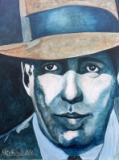Harlem Renaissance
In the early 1920's there was a movement called the "Negro" or "Harlem Renaissance". This resurgence of literature, knowledge, and the arts coming out of New York was powerful.

Morgan Freeman is an American actor, film director, and narrator. He is noted for his reserved demeanor and authoritative speaking voice. Freeman has received Academy Award nominations for his performances in Street Smart, Driving Miss Daisy, The Shawshank Redemption and Invictus and won in 2005 for Million Dollar Baby. He has also won a Golden Globe Award and a Screen Actors Guild Award. With an authoritative voice and calm demeanor, this ever popular African American actor has grown into one of the most respected figures in modern US cinema.
Morgan Freeman was born in Memphis, Tennessee, the son of Mayme Edna and Morgan Porterfield Freeman, Sr., a barber who died in 1961 from cirrhosis. He has three older siblings. Freeman was sent as an infant to his paternal grandmother in Charleston, Mississippi. His family moved frequently during his childhood, living in Greenwood, Mississippi; Gary, Indiana; and finally Chicago, Illinois. Freeman made his acting debut at age nine playing the lead role in a school play. He then attended Broad Street High School, currently Threadgill Elementary School, in Mississippi.
At age 12, Morgan Freeman won a statewide drama competition, and while still at Broad Street High School, he performed in a radio show based in Nashville, Tennessee. In 1955, he graduated from Broad Street, but turned down a partial drama scholarship from Jackson State University, opting instead to work as a mechanic in the United States Air Force.
Freeman moved to Los Angeles in the early 1960s and worked as a transcript clerk at Los Angeles Community College. During this period, he also lived in New York City, working as a dancer at the 1964 World's Fair, and in San Francisco, where he was a member of the Opera Ring music group. Freeman acted in a touring company version of The Royal Hunt of the Sun, and also appeared as an extra in the 1965 film "The Pawnbroker".
Morgan Freeman made his off-Broadway debut in 1967, opposite Viveca Lindfors in The Nigger Lovers, a play about the civil rights era "Freedom Riders", before debuting on Broadway in 1968's all-black version of Hello, Dolly!, which also starred Pearl Bailey and Cab Calloway.
Then came the Seventies, and the first real taste of fame. Strangely, considering he's now one of the most respected screen actors alive, this came with the TV series The Electric Company, a kind of prototype Sesame Street that taught kids phonetics and grammar via sketches, songs and cartoons. Co-starring with Rita Moreno and Bill Cosby, Freeman appeared as such characters as Easy Reader, Count Dracula, the Mad Scientist and, naturally given the roles to come, The Cop. Freeman later took a supporting role in the film Brubaker but things cooled off after that.
Fed up with the lower wages of theatre and having two children to support Freeman auditioned for, and won, the role of a doctor in the daytime soap-opera, Another World. He kept the regular work for two years before leaving to take a role in the film, Harry and Son.
Morgan Freeman returned to Broadway where he was making a name for himself. It was back on Broadway that Freeman landed his Obie award-winning role in the stage version of Driving Miss Daisy. His role as the dignified chauffeur assisting a moody pensioner gave him much needed publicity and it was not long before he landed a role opposite Christopher Reeve in Street Smart. Freeman was 50 in 1987 and winning praise for his characterization of a menacing pimp. He also won his first Oscar nomination for the part. Two years later, Freeman was nominated for another Oscar for playing Hoke Colburn, the chauffeur in the film version of Driving Miss Daisy, opposite Jessica Tandy.
In 1993, Freeman demonstrated his skills on the other side of the camera, making his directorial debut with Bopha!, the story of a South African cop alienated from his son by apartheid. The following year, the actor received a third Oscar nomination as an aged lifer in the prison drama The Shawshank Redemption. He went on to do steady work throughout the rest of the decade. In 2000, as a 63-year-old, Freeman kissed Renée Zellweger in Nurse Betty; it was his first on-screen kiss.
By the time Freeman appeared opposite Hilary Swank and Clint Eastwood in Eastwood's acclaimed 2004 boxing drama Million Dollar Baby, his reputation as one of Hollywood's hardest-working, most-respected actors was cemented in place. When Freeman took home the Best Supporting Actor Oscar at the 77th Annual Academy Awards for his performance as the former boxer turned trainer who convinces his old friend to take a scrappy female fighter (Hilary Swank) under his wing, the award was considered overdue given Freeman's impressive body of work.
In 2005, Freeman labeled the concept of a month, dedicated to black history in America, as “ridiculous’’. He told a 60 Minutes reporter: “You're going to relegate my history to a month? I don't want a black history month. Black history is American history.’’Freeman has played a black President, twice played God and played civil rights activist Nelson Mandella.
Morgan Freeman has worked hard and tries to give something back. Having co-founded the Frank Silvera Writers' Workshop, he's also donated $250,000 to establish a chair of performing arts at Hutchison School for Girls in his birthplace, Memphis. When relaxing, he likes to ride. He owns horses and a boat, as well as collections of gold coins and rare stamps. Coming from so little, Morgan Freeman now owns property in Mississippi, New York, Los Angeles and the Virgin Islands.
Don't miss a single page. Find everything you need on our complete sitemap directory.
Listen or read the top speeches from African Americans. Read more
Read about the great African Americans who fought in wars. Read more
African Americans invented many of the things we use today. Read more
Thin jazz, think art, think of great actors and find them here. Read more
Follow the history of Black Americans from slave ships to the presidency. Read more
Olympic winners, MVPS of every sport, and people who broke the color barrier. Read more
These men and women risked and sometimes lost their life to fight for the cause. Read more
Meet the people who worked to change the system from the inside. Read more

Visit my RedBubble page and use Michael Arnold Art to create greeting cards, T-shirts, mugs, and more.

The variety and impressive numbers of mammals, birds and marine wildlife in Alaska draw visitors from all over the world. For some travelers, Alaska is wilderness, at least compared to what they may know from back home. The pristine wilderness of Alaska is, perhaps, the last vestige of thriving populations of North American wildlife. Where else can you see polar bears, bald eagles, blue and humpbacked whales, gray wolves, grizzly bears, orcas, lynx, moose, and hundreds of other rare and endangered species in their original and undisturbed natural habitats?

Enjoy our website filled with original signed acrylic paintings by award winning Artist Michael Arnold. Located in Citrus County Florida, Michael Arnold is a the editor at the Citrus County Chronicle. When he's not busy being an editor, he is an avid artist who enjoys painting in a variety of styles. We hope you take the time to click on each image to see a larger view and to learn what the artist, Michael Arnold has to say about his paintings.

As dog owners and people who care deeply for animals and wildlife, we wanted our Dog Encyclopedia to be a website that could empower pet owners to create the most positive, loving environment for their dogs. Dog Encyclopedia realizes that owning a dog is like adding a new member to your family.

Floridian Nature has everything your are looking for in Florida nature. The wildlife of Florida is rich and varied, yet most of us are familiar with only a dozen or so species: the "well known endangered species such as manatees and panthers; those, like raccoons and squirrels, that have adapted to urban environments; the frightening alligators and black bears; and those like the armadillo who can't seem to cross the road. Yet they are just a few of the many animal species found in Florida.
